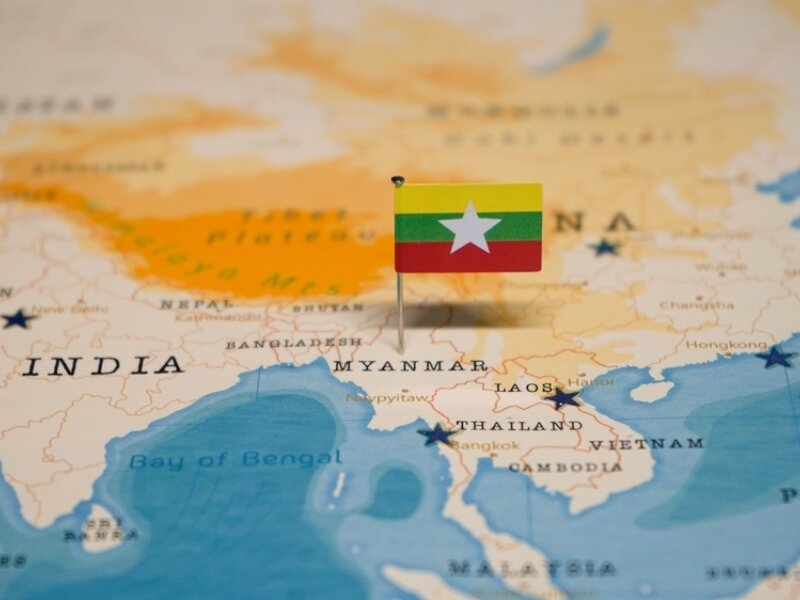Blinken’s trip to the Near East
US Secretary of State Anthony Blinken’s trip aims to contain recently emerged tensions between the United States and countries in the Near East, also in light of the recent Ukrainian crisis. By Anna Maria Cossiga

Sde Boker, Negev Desert
The conflict in Ukraine has triggered lively political and diplomatic activism in the Near East and North Africa, with regional leaders meeting several times in the space of a few days. This was driven by the increasing awareness that the international balance of power is evolving from a unipolar to a multipolar model, which requires the creation of regional balance and governance in the Arab world.
The Ukraine conflict has also raised significant tensions between the US and some of its allies in the region, as the US did not appreciate the neutral positions adopted by some countries. Nonetheless, differences between friends can always be settled. This is what the US Secretary of State Anthony Blinken tried to do on his tour of Israel, the West Bank, Morocco and Algeria from 26 to 30 March. Many relevant and strategic issues were on the trip’s agenda, including the respective positions towards Russia in the Ukrainian conflict, Iran and its proxies, anddem the Israeli-Palestinian conflict.
Israel was Blinken’s first stop. Here, the US Secretary of State held a summit – defined as historic – with the Israeli Foreign Minister, Yair Lapid, as well as counterparts from the United Arab Emirates, Egypt, Bahrain and Morocco. The UAE, Bahrain and Morocco normalized their relations with Israel through the 2020 Abraham Accords – which were firmly promoted by the US – while Egypt was the first Arab country to sign a peace treaty with the State of Israel in 1979.
Upon his arrival in Israel, Blinken stated that the United States had vital interests in the part of the world he was about to visit, which included some of its “closest friends”. Before going to the summit in Sde Boker, in the Negev Desert, he met with Mahmoud Abbas, the President of Palestine, reaffirming his Administration’s commitment to the two-State solution. In a meeting with Defence Minister Benny Gantz, he urged for “practical measures” to be taken to support the Palestinians[1] – only a few hours before the third of a series of bombings once again shed blood across the country.
The concerns of Israel and of the Gulf Countries over the activities of the proxies of Teheran – Hezbollah and the Houthi – and the imminent renewal of the nuclear deal with Iran were among the key issues discussed in the meetings. Secretary of State Blinken emphasized the fact that Iran continued its aggressions in the Middle East, but assured that the United States would continue to confront them whenever this represented a threat to its allies[2], and that it would not allow Iran to obtain nuclear weapons[3].
Drawing a parallel with the Russian conflict in Ukraine, Blinken also said that if Iran had a nuclear weapon, or if it was capable of acquiring one in the short term, it would consider itself free to act “with a false sense of impunity”[4] – just as Russia is currently doing in Ukraine.
Blinken’s trip continued through Morocco and Algeria, two countries that had suspended mutual diplomatic relations since 2021 over the conflict in Western Sahara – an issue that has divided them for decades. With the Abraham Accords, the Trump Administration recognized Morocco’s sovereignty over the area, promising to open a consulate in Dakhla[5]. Biden has not yet kept the promise and Blinken discussed the issue with the Moroccan Foreign Minister, Nasser Bourita[6]. In a communiqué, the American Department of State said, as it had already done on other occasions, that the US “continues to view Morocco’s autonomy plan as serious, credible, and realistic, and a potential approach to satisfy the aspirations of the people of Western Sahara”[7]. Another point on the meeting’s agenda regarded the coordination of a partnership on regional security, including combating terrorism in the Sahel[8].
In Rabat, Blinken met with United Arab Emirates Prince bin Zayed. During the previous month, there had been some tensions between the USA and the UAE. The UAE voted in favor of the two UN General Assembly Resolutions condemning the Russian invasion of Ukraine and demanding access to humanitarian aid to the country, but it did not impose sanctions on Russia and even received Syrian president Bashar al-Assad on 19 March. According to the Emirati Ambassador in Washington, Yousef Al Otaiba, the meeting served to “bring UAE-USA relations back on the right track”[9].
Blinken’s last stop was in Algeria, where he met with President Tebboune and Foreign Minister Lamamra. The visit took place at a particularly sensitive moment in the relations between Algeria and Morocco and against the backdrop of the invasion of Ukraine by Russia, with which Algeria traditionally held close relations. As one of the world’s main gas producers, at this delicate moment Algeria is at the heart of Europe’s interests in view of a possible replacement of Russian gas.
The agenda also included the possible reopening of the Maghreb-Europe Gas Pipeline which used to transport Algeria’s gas to Spain across Morocco. The pipeline was subsequently closed, following Algeria’s refusal to renew a 25-year gas transport agreement, which came at the height of tensions between the two countries. The request to reopen the pipeline had already been submitted by the US Deputy Secretary of State Wendy Sherman at the beginning of March, with no success[10]. Blinken did not mention it in the press conference following the meetings[11]. However, he stated that, after the invasion of Ukraine, all countries should “reassess” their relations with Russia and “express their support for the territorial integrity of other States”[12].
The United States seems to have succeeded in lowering tensions with the Near Eastern regional powers, even if Blinken’s visit to Algeria did not probably reap the desired fruits. Nonetheless, Blinken’s meetings with the foreign ministers of the region’s most important countries as well as with some of their leaders highlighted the need to create the conditions for a more effective and sustainable balance in the region.
[1] https://www.haaretz.com/israel-news/LIVE-lapid-and-blinken-meet-ahead-of-israel-s-mideast-summit-1.10700744.
[2] https://www.jpost.com/israel-news/politics-and-diplomacy/article-702431.
[3] https://www.state.gov/secretary-antony-j-blinken-and-israeli-foreign-minister-and-alternate-prime-minister-yair-lapid-at-a-joint-press-availability/.
[4] https://www.state.gov/secretary-antony-j-blinken-and-israeli-foreign-minister-and-alternate-prime-minister-yair-lapid-at-a-joint-press-availability/.
[5] https://www.france24.com/fr/afrique/20220331-en-alg%C3%A9rie-antony-blinken-d%C3%A9nonce-l-impact-dans-le-monde-arabe-de-l-invasion-russe-en-ukraine.
[6] https://www.aljazeera.com/news/2022/3/29/blinken-in-morocco-amid-shifts-in-regional-diplomacy.
[7] https://www.i24news.tv/fr/actu/international/1648555945-antony-blinken-au-maroc-pour-consolider-un-partenariat-securitaire-regional.
[8] https://www.lemonde.fr/afrique/article/2022/03/29/anthony-blinken-en-visite-au-maroc-pour-fortifier-un-partenariat-securitaire-regional_6119642_3212.html.
[9] https://www.axios.com/blinken-mbz-meeting-eases-tensions-uae-01843e62-dfc7-433a-bd5f-0cf339900f01.html.
[10] https://www.africanews.com/2022/03/30/algeria-blinken-thought-to-have-urged-for-gas-pipeline-to-europe-to-reopen-on-state-visit/.
[11] https://www.france24.com/fr/afrique/20220331-en-alg%C3%A9rie-antony-blinken-d%C3%A9nonce-l-impact-dans-le-monde-arabe-de-l-invasion-russe-en-ukraine.
[12] https://apnews.com/article/russia-ukraine-middle-east-africa-antony-blinken-north-africa-f3d4b0be50608327e8cdcc1057bebfe9.



